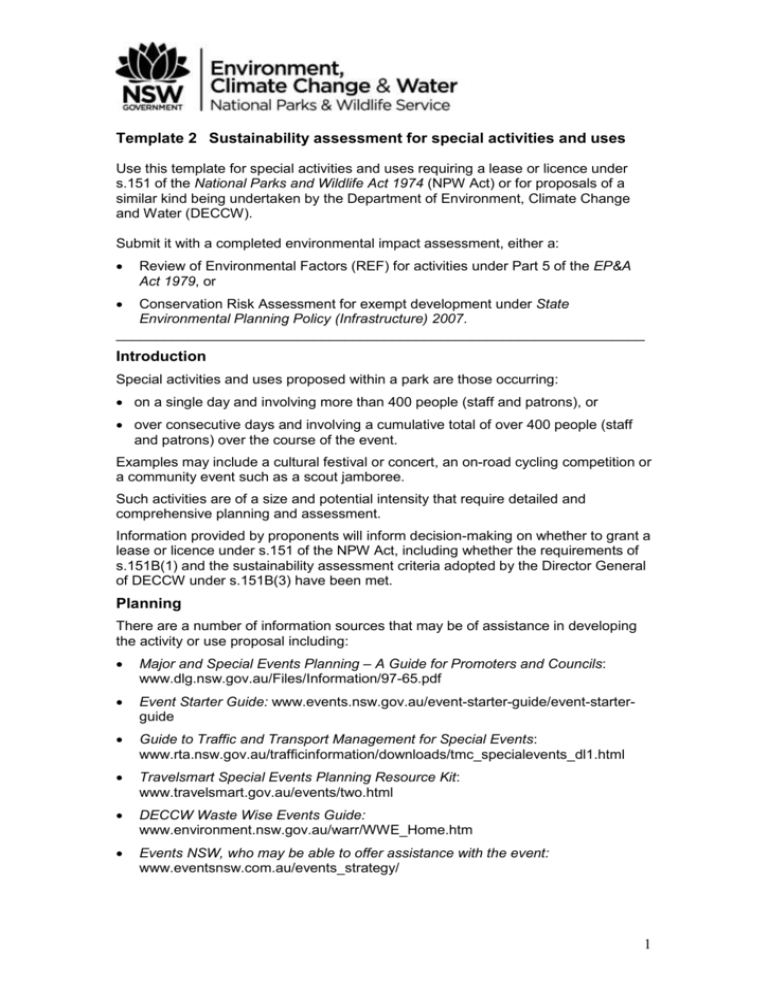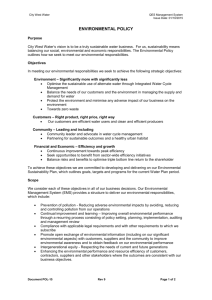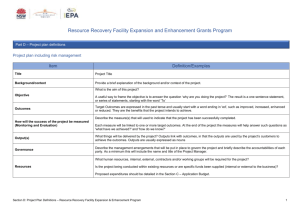Template 4 Sustainability assessment for special activities and uses
advertisement

Template 2 Sustainability assessment for special activities and uses Use this template for special activities and uses requiring a lease or licence under s.151 of the National Parks and Wildlife Act 1974 (NPW Act) or for proposals of a similar kind being undertaken by the Department of Environment, Climate Change and Water (DECCW). Submit it with a completed environmental impact assessment, either a: Review of Environmental Factors (REF) for activities under Part 5 of the EP&A Act 1979, or Conservation Risk Assessment for exempt development under State Environmental Planning Policy (Infrastructure) 2007. ___________________________________________________________________ Introduction Special activities and uses proposed within a park are those occurring: on a single day and involving more than 400 people (staff and patrons), or over consecutive days and involving a cumulative total of over 400 people (staff and patrons) over the course of the event. Examples may include a cultural festival or concert, an on-road cycling competition or a community event such as a scout jamboree. Such activities are of a size and potential intensity that require detailed and comprehensive planning and assessment. Information provided by proponents will inform decision-making on whether to grant a lease or licence under s.151 of the NPW Act, including whether the requirements of s.151B(1) and the sustainability assessment criteria adopted by the Director General of DECCW under s.151B(3) have been met. Planning There are a number of information sources that may be of assistance in developing the activity or use proposal including: Major and Special Events Planning – A Guide for Promoters and Councils: www.dlg.nsw.gov.au/Files/Information/97-65.pdf Event Starter Guide: www.events.nsw.gov.au/event-starter-guide/event-starterguide Guide to Traffic and Transport Management for Special Events: www.rta.nsw.gov.au/trafficinformation/downloads/tmc_specialevents_dl1.html Travelsmart Special Events Planning Resource Kit: www.travelsmart.gov.au/events/two.html DECCW Waste Wise Events Guide: www.environment.nsw.gov.au/warr/WWE_Home.htm Events NSW, who may be able to offer assistance with the event: www.eventsnsw.com.au/events_strategy/ 1 Complete the template following discussion with the park manager. Proponents should complete only those parts of the template, and provide supporting information, that are directly relevant to the proposal. If a particular issue or factor is not relevant this should be noted (indicate with ‘not applicable’ or ‘N/A’, with a brief explanation if necessary). Proponents should refer to the sustainability assessment criteria for further information on the factors, guiding principles and considerations or benchmarks that are most applicable to the proposal. If the completed environmental impact assessment already provides the necessary information, then the relevant sections of that assessment should be referenced below. Project title Event or function name Proposed location Identify the location within the park proposed for the activity or use, including suitable maps, plans, diagrams and photos. 2 1 Planning for sustainability prior to the activity or use Pre-planning is the most important stage for achieving a sustainable activity. Strategies can be investigated, developed and tested. Potential impacts can be identified and assessed to gain a clear understanding of whether the proposal can achieve desired outcomes. Factor: Defining the proposal Documentation: Provide information addressing the sustainability assessment criteria, including a written outline of proposal and relevant maps, plans and diagrams. Note: If approval is granted, submission of a detailed production schedule may be required closer to the activity date. Factor: Activity management Documentation: Provide information addressing the sustainability assessment criteria. Note: If approval is granted, submission of the following detailed plans may be required closer to the activity date: public relations, marketing and sponsorship plan risk management, security and/or emergency management plan. 3 2 Access and transport Some types of activities and uses have the potential to generate large crowds with significant transport requirements (for example concerts and cultural events). Many parks will not be readily accessible by mass public transport, and may also not be able to accommodate large volumes of vehicle traffic. Transport issues are also not confined to the park, and may result in spill-over effects to surrounding areas. Factor: Access and transport arrangements Documentation: Provide information addressing the sustainability assessment criteria, including relevant maps, plans and diagrams. Note: If approval is granted, a detailed access management plan may be required to be submitted closer to the activity date. 3 Waste management Activities and uses can produce significant amounts of waste materials within very short time periods. Effective waste management requires an active approach during the activity, rather than simply waiting to the conclusion to allow collection and disposal. Producing less waste has the added advantage of lowering running costs. Factor: Waste management arrangements Documentation: Provide information addressing the sustainability assessment criteria. Note: If approval is granted, submission of a detailed waste management plan may be required closer to the activity date. 4 4 Energy and water use Some activities and uses can generate high energy demands within a limited timeframe, especially lighting, audio-visual equipment, information technology, heating, cooling, and broadcasting. There may also be significant water use requirements including for human consumption and cleaning. Factor: Minimising energy and water use Documentation: Provide information addressing the sustainability assessment criteria. 5 Consumable products There is strong community interest in the sustainability of food, including its source, production and transport. Similarly, there many other products that may either be used or sold at events and functions that will affect the overall sustainability of the activity. Factor: Catering and merchandise Documentation: Provide information addressing the sustainability assessment criteria. Note: If approval is granted, submission of a detailed food and alcohol plan and/or merchandise plan may be required closer to the activity date. 5 Factor: Communication to participants Documentation: Provide information addressing the sustainability assessment criteria. 6 Promotion and education On-park activities, such as conferences, events and functions, provide an important opportunity to achieve one of the key objects of the NPW Act, namely the fostering of public appreciation, understanding and enjoyment of nature and cultural heritage and their conservation. They also provide scope to promote the running of sustainable activities, showcasing the management techniques and approaches that have been used. This may have the added benefit of increasing the profile and attraction of the event to potential patrons. Factor: Promotion, interpretation and education Documentation: Provide information addressing the sustainability assessment criteria. 6 7 Monitor performance Activities in parks provide opportunities to increase support for conservation and national parks. Reporting on the outcomes of the activity, in terms of the opportunities gained towards these ends and its overall sustainability, is critical to assessing whether future proposals of a similar nature are desirable. Reporting of incidents or impacts on park values is also important to assist in improving future management. Each activity or use proposal provides an opportunity to learn more about the sorts of activities that are sustainable and those that may not be. Factor: Monitoring performance Documentation: Provide information addressing the sustainability assessment criteria, including any professional certification required. Notes: 1. Projects involving building or infrastructure works (including temporary structures) will need to demonstrate compliance with relevant construction standards. Refer to DECCW’s Construction Assessment Procedures for more guidance. 2. If approval is granted, submission of a detailed monitoring plan may be required closer to the activity date. In addition, a monitoring report may be required after the event or function has been held. 7 8 Supporting documentation Provide any relevant plans or other supporting information. 9 Proponent sign-off Signature Name Position Date Published by: Department of Environment, Climate Change and Water 59–61 Goulburn Street, Sydney PO Box A290, Sydney South 1232 Phone: (02) 9995 5000 (switchboard) 131 555 (environment information and publications requests) 1300 361 967 (national parks, climate change and energy efficiency information and publications requests) Fax: (02) 9995 5999 TTY: (02) 9211 4723 Report pollution and environmental incidents: Environment Line: 131 555 (NSW only) or email info@environment.nsw.gov.au Website: www.environment.nsw.gov.au DECCW 2011/0019 February 2011








